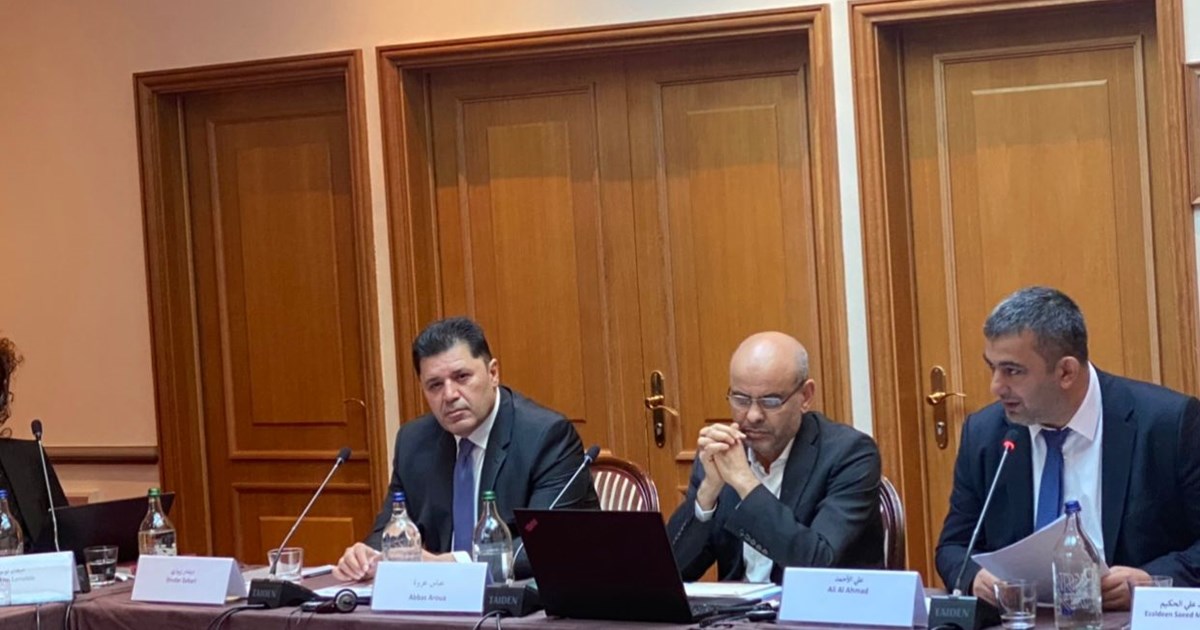In Geneva the KRG Coordinator for International Advocacy Sheds Light on the Efforts to Rescue the Kidnapped from the Hands of ISIS Terrorists

Head of OCIA Discusses Efforts to Rescue the Kidnapped from the Hands of ISIS Terrorists in Geneva
Erbil, Kurdistan Region (GOV.KRD) - In cooperation with the Swiss Ministry of Foreign Affairs and with the participation of the representative of the Kurdistan Regional Government and the federal government, the Cordoba Institute for Peace - Geneva held a consultative meeting on Thursday to discuss research papers on the right to know the fate of the missing persons in Geneva within the Kurdistan Regional Plan and the National Plan for Human Rights.
At the beginning of the meeting, Dr. Dindar Zebari, KRG Coordinator for International Advocacy gave a speech in which he referred to the process of implementing and following up the region’s plan for human rights at the international level, since enforced disappearance is among the areas included in the plan. Among 389 recommendations addressed to the region, there are 9 recommendations on the crime of enforced disappearance. The Parliament of the Kurdistan Region enacted the Law of Missing Persons in the Campaigns of Genocide against the People of Kurdistan that includes the crimes of Anfal, Halabja, the Genocide of the Barzanis, and the Genocide of the Faili Kurds. In 2021 there was a proposal to amend the aforementioned law to include victims of the crimes of the terrorist organization ISIS, in addition to the law on the rights and privileges of the families of the martyrs and the dead for the Kurdistan Region - Iraq.
The KRG Coordinator highlighted the efforts of the regional government to rescue the kidnapped from the hands of ISIS terrorists, saying: After the attacks of ISIS terrorists, the Council of Ministers in the region formed a ministerial committee to define ISIS terrorist acts as a crime of genocide and another committee to free the abductees, whose number reached (6,417), including 3548 females and 2869 males. Due to the efforts of the regional government, 3,554 people were rescued. The KRG has also started documenting ISIS crimes: 5,170 files have been archived, of which more than 2,324 files have been completed from a legal point of view, 2,000 are still under investigation, and 2,916 cases have been registered as missing. Social and psychological support was provided to more than 2,234 victims.
Zebari praised KRG-UNITAD coordination, saying: After the issuance of UN Security Council Resolution No. 2379 of (2017) to form the UN Team to Promote Accountability for Crimes Committed by Daesh(UNITAD), the regional government cooperated with the aforementioned team within the framework of the National Coordinating Committee for Cooperation with UNITAD covers a wide range of topics including capacity building for judges and investigators, digitization, witness protection, opening mass graves and repatriation of remains, and interviews with detainees, to document these crimes with the aim of bringing the perpetrators to a competent court and compensating the families of the victims.
And he added: As part of the archiving process, in cooperation with UNITAD, evidence consisting of documents, judicial cases, videos, photos and audio recordings was collected from the Office for the Rescue of the Kidnapped Yazidis, where 3543 files of 5393 pages were archived. From the Zervani Peshmerga forces, 384 MB (124 images) and (28.3) GB of (105 video clips) have been archived, and work is still in progress on the project.
On the possibility of prosecuting ISIS criminals, Dr. Dindar Zebari said: The crimes committed by ISIS against all components of the Kurdistan Region of Iraq are considered international crimes, as they are crimes against humanity, war crimes and genocide. Therefore, the Kurdistan Regional Government prepared a draft law establishing a specialized court for crimes committed by ISIS terrorists. The draft law was referred to the regional parliament, and the first reading of the draft resolution took place.
The coordinator of international recommendations also added: We held several meetings with the concerned authorities and the United Nations on this issue, but in a precedent that is the first of its kind, the Federal Supreme Court rejected the draft decision based on press reports. Nevertheless, more discussions must be held, in coordination with the international side, to discuss this issue and support this project, and the laws and legislations in force in the region, including the anti-terrorism law, to try ISIS terrorists before national courts.
